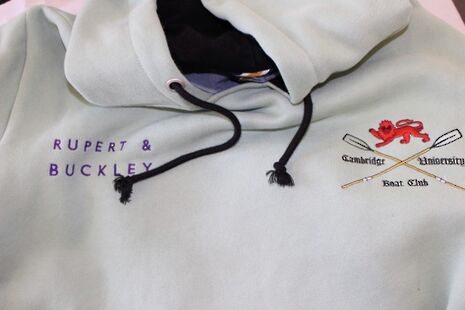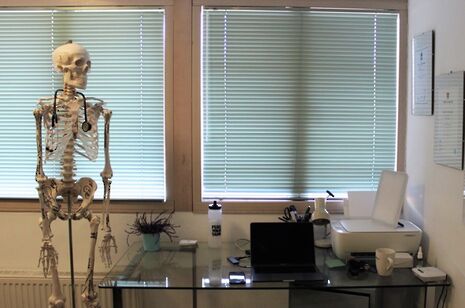DeskSpace: Family History
Milosz Wrobel, CUBC’s sports therapist and strength and conditioning coach, talks about the importance of integrating family and history into his working day at The Goldie Boathouse

The Goldie Boathouse, home of Cambridge University Boat Club since 1873, stands majestically by the River Cam. It is steeped in history and a fresh lick of light-blue paint.
The river shimmers off the tall glass panelled doors that mark the entrance to the gym, as if boathouse and river were one. I’m struck by the silent serenity of the scene as I slowly prise open one of the panels to enter. Once inside, the energy changes. The pounding beat of Pink Floyd’s “We Don’t Need No Education” thumps from a nearby speaker as three-rows-deep of Lycra clad students pull against the ergos deep in concentration, seemingly unaware of the irony of their overture. They quickly become aware of me however, as I apologetically (and rather ungracefully) weave in and out of the pull-and-thrust of their impressive synchronicity.
I make my way to the narrow staircase that leads to the office of Milosz Wrobel, CUBC’s sports therapist and strength and conditioning coach. I knock on the door and Milosz welcomes me in with a hearty handshake. I look around at the crisp-white modern clinic and comment on its noticeable accents of light-blue. “It’s a theme” Milosz says as he offers me a seat. Comfortably perched on a massage table in the centre of the room the coach and I converse about the importance of honouring history, creating community and embracing family here at The Goldie Boathouse.
“It doesn’t matter whether it is a good day or bad day, even when it’s snowing people go out and row. I think to myself, if those guys can do it, I can do it. It keeps you motivated throughout the day”
Rachel Loughran: Your desk itself is very white, clinical, organised. Is that a deliberate aesthetic?
Milosz Wrobel: Yes. When you walk into the room your desk is the first thing you see, so I look at organising it as a priority. There will be extra items on it out the day obviously, like the mug here [Milosz picks up the mug and moves it off the desk]but at the end of the day I like to make sure the desk is set up at it was that morning.
RL: Does that level of organisation come naturally to you, or is it work focussed?
MW: A bit of both. I believe that if my environment is organised I can keep a level of organisation within my working day… we have 6-8 weeks left of training before the annual Boat Race against Oxford. It can become a bit stressful. You want all the athletes to be injury free and performing at their best… we are working hard to make sure that we have the best crews there on the day so that we do win, and we can celebrate after.
RL: Will you be celebrating with more than a mug of tea?
MW: I think so!
RL: I noticed you have a little pot of, is that lavender?
MW: To be honest you’d have to ask my partner, I’m terrible with flowers. The first time we came in here she said we need to get some flowers... I like having a flower or plant for the house too, although it’s another thing to look after. I mean I appreciate it, but I have a little child and a dog too, so it adds an extra responsibility to my day.
“There is something special about The Goldie Boathouse. People come from around the world to visit it. It’s important that you can see its history”
RL: The plant pot is in keeping with the light blue theme…
MW: We try and keep the character in terms of the colours, perhaps that’s why my partner chose the pot and the lavender, if you think it’s a lavender…
RL: Is the colour light blue banned at home?
MW: Well a lot of our uniform is light blue, so there’s a lot of light-blue washing to do…
RL: So, it makes sense to buy in blue!
MW: Exactly.
RL: Do you feel your work life and home life are very much separated?
MW: Yes and no. I work with my partner, which everyone suggested was going to be a very bad move, but it’s worked out well. My partner is a strength and conditioning coach – she works with the lightweight and the women’s team here. You have to stay professional regardless, so in that way do I aim to keep work and home separate.
RL: On the wall, I notice you have an old photograph of a race crew [the light-blue women’s crew, 1950.] Do you think it’s important to have a sense of history here at the boathouse?
MW: Absolutely. We do actually have some more old pictures that we want to put back in the office. There is a picture we have stored of one of the first ever women’s races. We’ll definitely put that back up. We also have some lovely books of newspaper cut-outs from races dating back to the 1900’s that we plan to put in the waiting room. I think they are very important to have. There is something special about The Goldie Boathouse. People come from around the world to visit it. It’s important that you can see its history, especially for those people who are linked to rowing, or have sons or daughters rowing in Cambridge.
RL: Do you also feel part of the rowing community?
MW: Whilst I didn’t go to Cambridge University myself, I have been involved ever since I graduated. So, I do believe there is a light-blue part of me… it’s a big part of my life and my family’s life. It’s a privilege to work here.
RL: Do you enjoy being so close the waterfront?
MW: Yes. I find very valuable in terms of my wellbeing. Even if the day is quite dark, and we are in the middle of winter, you still see crews of athletes out on the water. It doesn’t matter whether it is a good day or bad day, even when it’s snowing people go out and row. I think to myself, if those guys can do it, I can do it. It keeps you motivated throughout the day.
RL: I feel like there is one member of the team I’ve not been introduced to yet.
MW: Ah, Charles. [Milosz points to the skeleton beside his desk] Charles is a very valuable member of the business. Before we moved here he lived with me for ten years. He’s twelve years old and he comes from Germany.
RL: He’s pretty well developed for a twelve year old…
MW: He is well developed. He doesn’t have many misalignments, although his collar bone popped out, so he’s on the NHS waiting list.
RL: Are you doing a rehab programme with him too?
MW: The rehab is failing us, mainly due to the fact that there is not much muscle left on him. I first tattooed him [in black marker pen indicating the names of the bones] during my undergrad and I decided to keep them on him when I became professional. It’s part of the history here too.
RL: And the family?
MW: The family and the history.

 News / SU reluctantly registers controversial women’s soc18 December 2025
News / SU reluctantly registers controversial women’s soc18 December 2025 News / CUP announces funding scheme for under-represented academics19 December 2025
News / CUP announces funding scheme for under-represented academics19 December 2025 Features / Should I stay or should I go? Cambridge students and alumni reflect on how their memories stay with them15 December 2025
Features / Should I stay or should I go? Cambridge students and alumni reflect on how their memories stay with them15 December 2025 Fashion / The art of the formal outfit 18 December 2025
Fashion / The art of the formal outfit 18 December 2025 News / Dons warn PM about Vet School closure16 December 2025
News / Dons warn PM about Vet School closure16 December 2025










